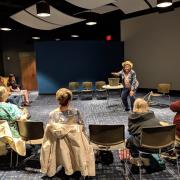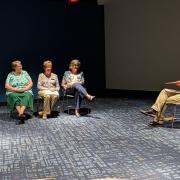Talking Tales offers patrons an opportunity to experience the world’s oldest art form — oral storytelling — while also learning new things about cultures around the world.
The program begins with a local storytelling troupe, the East Texas Storytellers, telling tall tales, folktales, myths and legends. Many months are themed around a particular idea or country. After the stories, the storytellers and presenter explore their tales, their origins and the region they came from in a format similar to a Q&A or talk show.
This is an ongoing program, held the second Thursday of each month.
Advanced Planning
I sought out a local guild and asked them if they would help us create a program where learning about folktales was just as important as telling them. The East Texas Storytellers gladly agreed, and we joined together to make Talking Tales.
As for advanced planning for each monthly program, usually the week after the last program, I’ll ask the tellers what stories they’ll be telling next time. I’ll also use this time to reach out to other organizations or tellers to see if any of them are interested, especially if one of my regulars is not available. I aim for three tellers per session. We theme each month and try to plan this a year in advance.
Before the next meeting, I’ll seek out each teller’s story, read it over and research the tale. Usually basic things: different versions, the region it originated from, etc. Then, I’ll write three or four questions to ask the tellers and email these to them in advance. As I research, I make a note of my sources and send them to the tellers, too, to make their research a little easier.
I do my best to use books when I can and am lucky that our library has a decent folklore collection. I also have my own growing folklore library at home.
Some websites I use are Mythopedia.com, Folklore Thursday (who inspired me to hold the programs on Thursdays. If you're into folklore and are on Twitter, I highly recommend you follow the hashtag) and the Encylopedia Britannica. And yes, I do use Wikipedia (who — slight digression — I don't see anything wrong with, so long as you double-check the information!).
Marketing
We promote using Facebook, our website, our programming brochure and other similar means. We also periodically put up posters at coffee shops and the like, where we think like-minded people may be attracted to the program.
When the Tejas Storytelling Association had their annual festival, the East Texas Storytellers put an ad in the festival’s program promoting Talking Tales.
Budgeting
We, like many libraries, are strapped for cash when it comes to programming. Storytellers can cost a good deal per session — and for good reason, as they have fine-tuned their art and should be compensated for it. But we struck gold by finding a local group who simply wanted to share their art.
I’d recommend anyone interested in a similar program to reach out to their local storyteller’s association. Many may be just like the East Texas Storytellers — simply excited to share their art. This also gives tellers an opportunity to practice and hone their craft.
Reach out to speaking organizations, like the Toastmasters. Toastmasters International has a module for storytelling, and could use this program as an opportunity to practice before performing their speech before their peers. See if local schools and colleges have speech organizations which may be interested in participating.
Lastly, don’t be afraid to perform yourself! I am a former theater major, and I absolutely love going up and sharing stories alongside the East Texas Storytellers. It allows me to flex some of those old acting muscles I haven’t had a chance to move in a while.
Day-of-event Activity
We set up 12 to 16 chairs in a large semicircle. During the second half of the program, I invite the storytellers back up and we talk about the tales, so I have a few chairs reserved for myself and the tellers for that portion.
Set-up is easy enough for me alone to handle. Make sure to take this time to set up any AV equipment that may be needed for the storytellers.
Program Execution
Each program is about an hour long, with usually three stories told by three tellers. Some odd days we’ve had four or only two, but three is the perfect number.
Then, I invite the ladies up and ask them the questions that we prepared ahead of time. I usually like to include a personal question, to create familiarity with the tellers, which they seem to enjoy.
Our attendance varies, based on who is telling, the subject, the weather, etc. Many retirees love the program and enjoy the relaxed atmosphere and the learning portion afterwards. There also tends to be at least one person who wanders in and stays, curious what the program is about.
The response has been overall positive, from both tellers and the audience. Sometimes, I’ll see a young family come in, then leave. I sometimes wonder if this is because they misunderstood the program to be a story time for kids. But we have developed a sort of regular following from a group of patrons. People love hearing folktales, and even more, they love learning about the stories behind them!
Probably our greatest outcome was the new partnerships we have formed. By having this program, we have connected with not only the East Texas Storytellers but people of other faiths (including faith leaders), speaking organizations such as the Toastmasters, and the like. These partnerships have assured that the library is a vibrant part of the community.
We survey our programs twice a year with a fairly simple survey, asking patrons where they heard of the program, what they like, suggestions for improvements, and what other types of programs they'd be interested in.Talking Tales always receives great responses. We see people from myriad ages and backgrounds coming together through Talking Tales.
Advice
Make sure distractions are limited, as they can throw off your tellers and the audience. Close the doors where you’re holding performances, if possible, and make sure any sound equipment is set up and prepared ahead of time.
If you know anything about performance, don’t feel afraid to give your regular tellers constructive criticism, but always be thankful to them. If your tellers are donating their time, allow them the means to promote their website.
As with all things, never be afraid to say no, even with a small, niche program such as this. If you can find a way to view a teller before inviting them to tell, do so! It’s best to know the teller and their talents so you can work with them in a way that gets the sort of performance you’re looking for.






